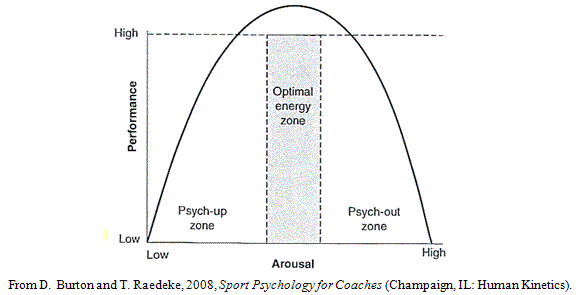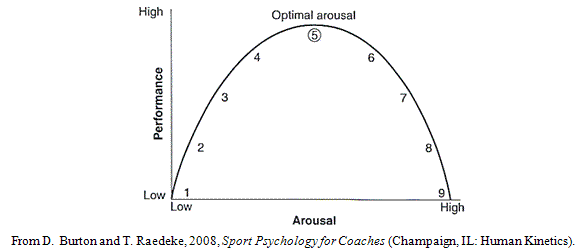 PSYCHOLOGICAL
SKILLS TRAINING: ENERGY MANAGEMENT PSYCHOLOGICAL
SKILLS TRAINING: ENERGY MANAGEMENT
written by Dr.
Christine Lottes
Psychological Skills
Training series: previous issues
- TRAINING
YOUR ATHLETES TO BE MENTALLY TOUGH
- MENTAL
TRAINING TOOLS
- GOAL
SETTING AND SELF-CONFIDENCE
- IMAGERY
- PSYCHOLOGICAL
SKILLS TRAINING: RELAXATION AND ENERGIZATION
- PSYCHOLOGICAL
SKILLS TRAINING: SELF-TALK SKILLS
Athletes need to manage both their physical and mental arousal
levels. Continuing our Psychological Skills Training
series in pelinks4u, this article provides a script
for the coach, and 2 reproducible handouts (one a script for
the coach plus a handout for athletes) as we look at how athletes
can successfully manage their physical and mental energy for
optimal athletic performance.
Coach's Script for: Energy Management
Bring to practice: coach's script, a copy
of the athlete's handout for each athlete
(follows coach's script), pencils or pens, chalk or dry board
markers
ENERGY MANAGEMENT
Take: booklets, pencils, notebook, chalk
or markers
Today: Energy Management
Introduction
- Energy management has to do with helping you control
your arousal- the physical and mental
energy that fuels your athletic performance.
- This energy is on a continuum
from deep sleep to intense excitement.
- Arousal involves both how much
the body is activated and how that activation
is interpreted. It's the body's way of
preparing for intense, vigorous activity.
- You have more or less arousal
at different times of the day and in different situations.
- Put the following on the arousal
continuum: sleep, practice, watching TV, playing in a state
tournament game, sitting in this session.

- When you are physically aroused complex changes happen
in your body. Have you ever heard of the "fight or
flight response?" (heart rate increases, breathing
increases, adrenaline and other hormones released, etc).
All gets you ready for physical action.
- Did you ever get "butterflies
in your stomach?" That's because of decreased blood
flow to the digestive system. Your body diverts the blood
to where it's needed and away from the stomach, the bladder
empties making for plenty of trips to the bathroom, and
blood flow to extremities slows down so your hands and feet
get cold.
- Two reasons understanding arousal
is important:
- Physical symptoms are normal
and signal readiness to compete; nothing to worry about.
- Athletes with elevated arousal
deal with it in various ways - pacing, talking incessantly
screaming - while some yawn, nap. Both approaches can
be effective in controlling arousal.
- So, each person must find an energy
management strategy that works for him/her to attain optimal
arousal in practice and competition.
- How does arousal affect performance?

- Arousal too low: you'll lack sufficient
physical and mental energy to perform to
your best.
- Arousal too high:
you'll suffer from a variety of problems related to tension,
attention, motor control and interpretation that prevent
you from performing your best.
- You want moderate arousal.
- Athletes have different optimal
energy zones.
- How do you figure out your optimal
energy zone?
- Know your personality and
athletic ability - introvert vs. extrovert; how much
athletic ability; how long does it take me to get ready
mentally; how do I respond to outside circumstances
and people?
- Know what you need to do in
your sport position - running full out doesn't take
much precision but (coach, change the following skills
to skills from your sport) tackling, passing, and shooting
do.
-
Use the Arousal Monitoring Scale:
assign yourself a score repeatedly during practice
(and later during competition), and over time you'll
discover what optimal arousal (5) feels like for you
in various situations and be able to play more consistently
in zone 4-6.

- If you are not in your zone, you can do rapid
relaxation to lower arousal or energization
to increase arousal.
- Mental side of arousal: how
you interpret physical changes (butterflies
in stomach as a sign of excitement and anticipation
of the competition to come, or as a cause for worry
and anxiety about how you're going to perform) has a
huge effect on how you perform.
- If you interpret arousal positively,
as a challenge, readiness, or excitement, you can experience
top performance and flow.
- If you interpret it negatively,
you are likely to perform poorly.
- If you start to experience
self-doubt, loss of control or images of failure, use
mental training tools to get self back in zone. First
relax completely in order to lower
arousal. Then use self-talk to reinterpret
your arousal constructively and rebuild self-confidence.
Then use energization skills to raise
arousal back to your optimal energy zone.
- List 3 different skills you
do in your sport position and then check if each requires
low or high arousal:

- As you consider your personality, do you generally need
to increase or decrease your arousal level to get into your
optimal energy zone for competing?
__________ Increase ___________ Decrease (Check one)
- Think back to a competition where
your performance seemed to go up or down depending on what
you were thinking and feeling. Write a bit about that.
- During practice, check yourself
on the Arousal Monitoring Scale. Use relaxation or energization
as needed.
Upcoming article on Mental Training
In a future edition of pelinks4u we will be discussing
stress management. Athletes must learn how to deal with stressors
if they are going to reach their potential and achieve their
competitive goals. A script for the coach and a reproducible
handout for athletes will be provided.
Download
Coach's Handout Here!
Download
Athlete's Handout Here!
(back
to pelinks4u homepage) |




 PSYCHOLOGICAL
SKILLS TRAINING: ENERGY MANAGEMENT
PSYCHOLOGICAL
SKILLS TRAINING: ENERGY MANAGEMENT


